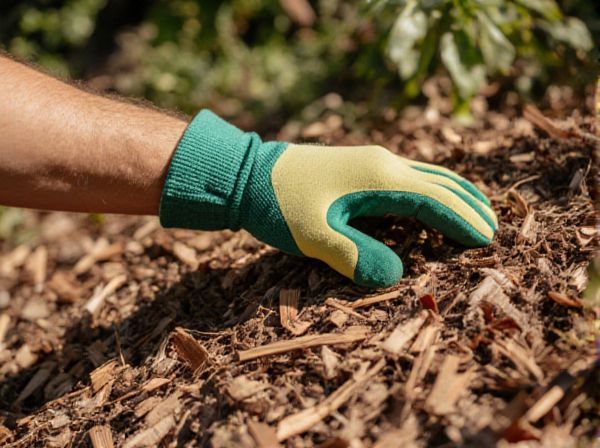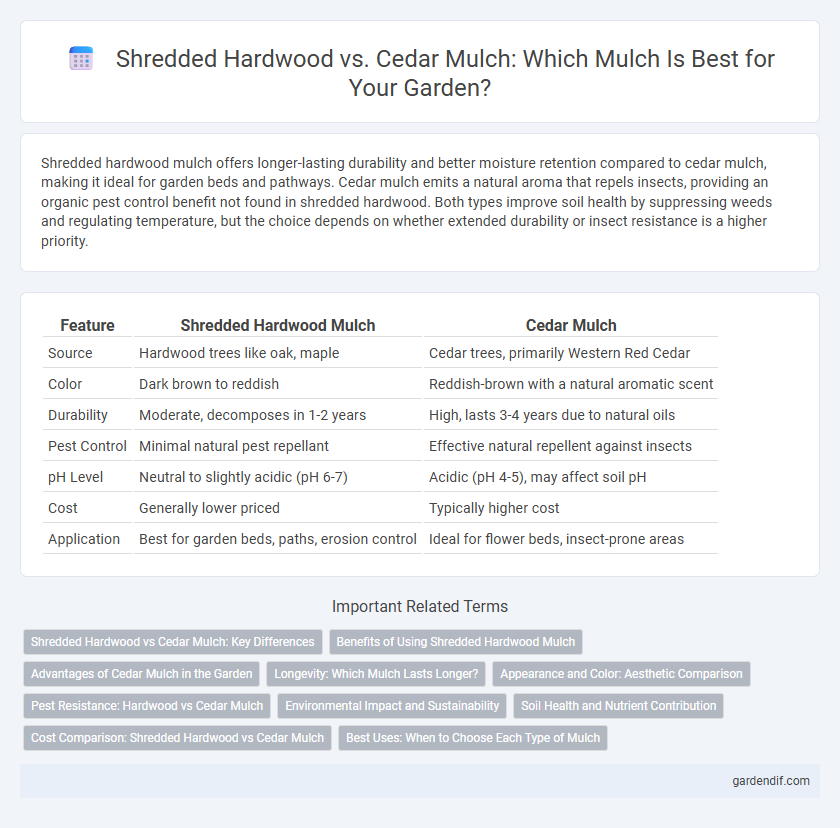
Shredded hardwood vs Cedar mulch Illustration
Shredded hardwood mulch offers longer-lasting durability and better moisture retention compared to cedar mulch, making it ideal for garden beds and pathways. Cedar mulch emits a natural aroma that repels insects, providing an organic pest control benefit not found in shredded hardwood. Both types improve soil health by suppressing weeds and regulating temperature, but the choice depends on whether extended durability or insect resistance is a higher priority.
Table of Comparison
| Feature | Shredded Hardwood Mulch | Cedar Mulch |
|---|---|---|
| Source | Hardwood trees like oak, maple | Cedar trees, primarily Western Red Cedar |
| Color | Dark brown to reddish | Reddish-brown with a natural aromatic scent |
| Durability | Moderate, decomposes in 1-2 years | High, lasts 3-4 years due to natural oils |
| Pest Control | Minimal natural pest repellant | Effective natural repellent against insects |
| pH Level | Neutral to slightly acidic (pH 6-7) | Acidic (pH 4-5), may affect soil pH |
| Cost | Generally lower priced | Typically higher cost |
| Application | Best for garden beds, paths, erosion control | Ideal for flower beds, insect-prone areas |
Shredded Hardwood vs Cedar Mulch: Key Differences
Shredded hardwood mulch is known for its dense texture and slow decomposition rate, providing long-lasting weed control and soil moisture retention, making it ideal for garden beds and landscaping. Cedar mulch, derived from cedar trees, offers a natural insect-repellent quality due to its aromatic oils, which helps protect plants from pests while also adding a distinctive reddish hue to garden aesthetics. Both mulches improve soil health, but shredded hardwood tends to be more cost-effective and durable, whereas cedar mulch excels in pest resistance and visual appeal.
Benefits of Using Shredded Hardwood Mulch
Shredded hardwood mulch improves soil moisture retention and moderates temperature fluctuations, promoting healthy root development for plants. It decomposes slowly, providing long-lasting nutrient release and enhancing soil fertility over time. This mulch also suppresses weeds effectively while maintaining an attractive, natural appearance in garden beds and landscapes.
Advantages of Cedar Mulch in the Garden
Cedar mulch offers natural insect-repellent properties that help protect garden plants from pests, reducing the need for chemical pesticides. Its appealing reddish-brown color enhances garden aesthetics while providing excellent moisture retention and temperature regulation for soil health. Cedar mulch also decomposes slowly, ensuring long-lasting coverage and minimizing frequent replacement compared to shredded hardwood mulch.
Longevity: Which Mulch Lasts Longer?
Shredded hardwood mulch typically lasts longer than cedar mulch due to its dense composition and slower decomposition rate, often maintaining effectiveness for up to two years. Cedar mulch, while known for its natural pest-repellent properties, breaks down more quickly, usually lasting around six to twelve months. Choosing shredded hardwood mulch ensures extended soil moisture retention and weed suppression, reducing the frequency of reapplication.
Appearance and Color: Aesthetic Comparison
Shredded hardwood mulch features a rich, dark brown color that deepens with moisture, offering a classic, natural look that complements a wide variety of garden styles. Cedar mulch boasts a vibrant reddish hue and a distinctive texture, providing a more visually striking appearance that enhances the landscape's aesthetic appeal. Both mulches maintain their color well over time, but cedar tends to resist fading longer due to its natural oils and durability.
Pest Resistance: Hardwood vs Cedar Mulch
Shredded hardwood mulch offers moderate pest resistance but can retain moisture, potentially attracting termites and other insects if not properly maintained. Cedar mulch contains natural oils that repel many pests, such as ants, termites, and mosquitoes, making it a preferred choice for pest control in landscaping. Choosing cedar mulch enhances garden protection by reducing pest infestations while also contributing to soil health and moisture retention.
Environmental Impact and Sustainability
Shredded hardwood mulch offers superior sustainability due to its ability to decompose slowly, enriching soil nutrients without frequent replacement, which reduces landfill waste. Cedar mulch, while naturally resistant to decay and pests, often involves harvesting from coniferous trees that may affect forest ecosystems if not sourced responsibly. Choosing shredded hardwood mulch from recycled or locally sourced wood promotes environmental conservation and supports sustainable landscaping practices.
Soil Health and Nutrient Contribution
Shredded hardwood mulch breaks down slowly, enriching soil with organic matter and promoting microbial activity that enhances soil structure and nutrient retention. Cedar mulch contains natural oils that repel pests but decomposes more slowly, contributing fewer nutrients to the soil compared to hardwood. Choosing shredded hardwood mulch supports long-term soil health by improving nutrient cycling and moisture retention essential for plant growth.
Cost Comparison: Shredded Hardwood vs Cedar Mulch
Shredded hardwood mulch typically costs between $10 to $30 per cubic yard, making it a more budget-friendly option compared to cedar mulch, which ranges from $40 to $70 per cubic yard. The price difference is due to cedar's natural insect-repellent properties and its slower decomposition rate, which extends its lifespan. Homeowners seeking cost-effective landscaping materials often prefer shredded hardwood mulch for its affordability and similar functional benefits.
Best Uses: When to Choose Each Type of Mulch
Shredded hardwood mulch is ideal for garden beds and around trees because it decomposes slowly, providing long-lasting weed control and soil moisture retention. Cedar mulch is best used in landscaping areas where insect resistance is desired, as its natural oils repel pests and add a pleasant aroma. Choose shredded hardwood for nutrient-rich soil improvement and cedar mulch for decorative appeal with added pest deterrence.
Shredded hardwood vs Cedar mulch Infographic

 gardendif.com
gardendif.com